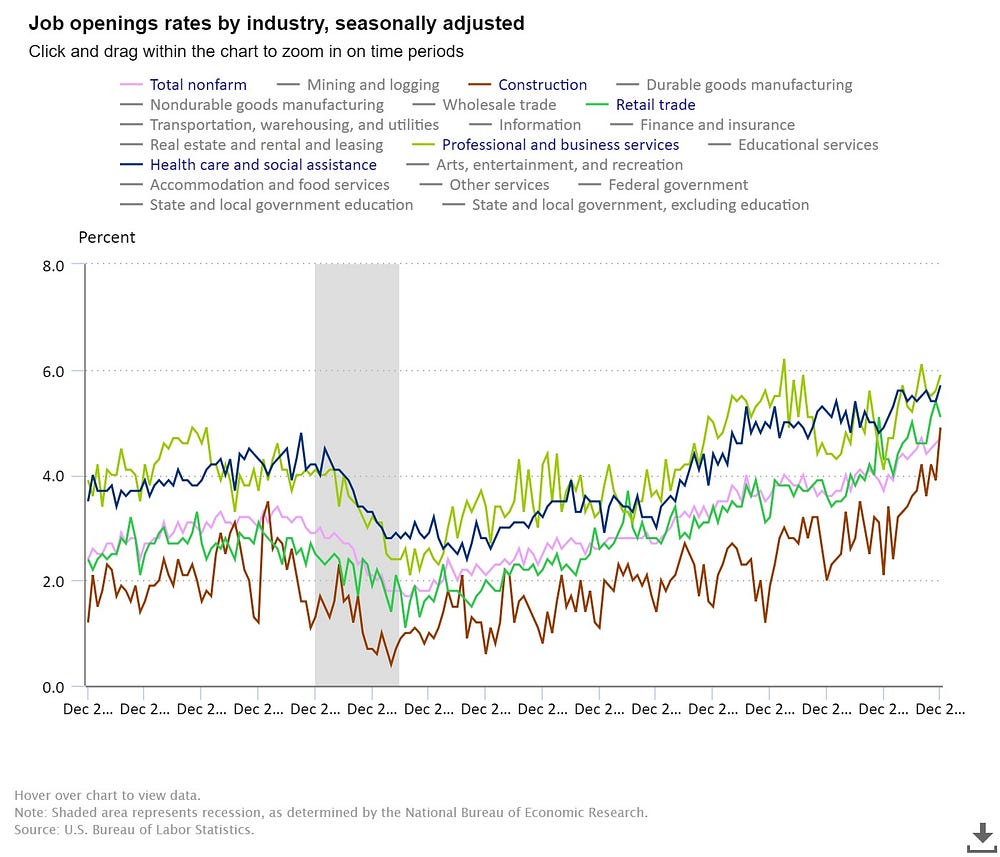Everyone’s hiring! 5 ways job-seekers can win in a changing job market
The U.S. talent shortage is creating IT career opportunities… for those who approach it right.
Whether you’re actively looking for a new career, or are just open to new opportunities, the future looks bright for job hunters! More job openings now exist than skilled candidates needed to fill them according to a report from The U.S. Bureau of Labor. With so many opportunities, both in Information Technology and elsewhere, the odds of you finding your perfect career is better than it’s been in years!
That’s the good news.
The not-so-good news?
Many prospective employees seem to be taking the job market for granted. Employers are seeing increases in prospective candidates ‘ghosting’ their interview, not calling or showing up for their first day of work, and even abandoning their current job altogether. This has left many companies confused, frustrated and, let’s be honest, bitter. What many interviewees don’t realize is that they’re not only hurting their prospects with that employer but, often, with entire regions, sectors and industries.
Why is now the time to prepare?
Your digital footprint is huge… and growing
Over 26 billion devices are expected to connect to the Internet of Things (IoT)by the end of 2019. It’s also estimated that, by 2020, 1.7 MB of data (your average 5-minute MP3) will be created for every individual on Earth… per second. That ‘Big Data’ is perpetually creating your digital footprint a.k.a. reputation. Anyone can add to it and everyone else can see it.
What do you want it to say?
What do you want it to say?
Your online reputation is permanent
That sea of data that you’re creating (and that’s being created for you) is too big to change. While you may not see it by just Googling yourself it definitely exists. Most anyone with the want or need to find it will be able to.
What do you want them to find?
What do you want them to find?
People, not just machines, are connected
That employer you’re interviewing with doesn’t exist in a bubble. Chances are they attend industry events, awards dinners and networking meetups with their peers. They likely have friends and former co-workers that work for different companies in the same industry. They exchange ideas on niche forums and professional LinkedIn groups. The bottom line is… they talk. What do you want them to tell each other?
Employees frequently leave companies… but rarely leave industries
The phrase “don’t burn your bridges” is cliché for a reason. It’s great advice. The staffing manager whose offer you’re declining today may very well be your interviewer, or even boss, at a different company tomorrow. It’s extremely rare that someone would paint you in a negative light just for declining an offer. However, declining it rudely or (possibly even worse) just cutting contact with no explanation will likely leave a terrible impression on someone you may be asking to hire you in the future.
How do you want hiring managers to describe you?
How do you want hiring managers to describe you?
The dreaded “blacklist”
It’s not as drastic as it sounds. In over 20 years of hiring I have yet to see a literal “blacklist” of candidates to avoid be it in person or online. However, will hiring managers remember candidates who left a bad taste in their mouth? You better believe it. Do they likely have a mental ‘do not hire’ list stored in memory? Pretty likely. Will they share that information with others? Probably not intentionally… but everyone’s human. How do you want industry leaders to remember you?
What should a job-seeker do right now?
All markets fluctuate. Stock prices, commodities, the price of Bitcoin… none follow a straight line. The job market is no different meaning that now is the best time to prepare. Applying just a few common-sense best practices to your personal brand today will set you up for success when your ideal opportunity becomes available tomorrow.
1. Scour your digital footprint
Now’s the time to Google yourself, ‘audit’ your social media, and take (some) control over what the internet says about you. Much of what you find can be changed or removed but it often takes weeks or months to do so. Remember… what you posted on Facebook years ago can and will be held against you in the court of employment.
2. Freshen up your professional profiles
Sites like LinkedIn, Github and Stack Overflow can be as important to employers as your resume or CV… if not more. After ensuring the basics are covered (accurate information, proof-read, etc.) be sure to freshen it up. Add your latest achievements, projects and certifications. Update your recommendations and testimonials. Modernize your profile photo and header. Don’t have anything new to share? Now’s the perfect time to enroll in a free course or find an open-source project to assist. The key is to stay relevant.
Want more personal branding tips? Check out my article;
“5 personal brand hacks to optimize your cyber reputation”
“5 personal brand hacks to optimize your cyber reputation”
3. Respond to everyone you can
If you’re lucky (or skilled) enough you may be receiving emails and LinkedIn messages left and right. That’s a good problem to have. It can be easy to ignore and just delete those that you’re not interested in. A much better long-term strategy, though, is to view every inquiry as an opportunity. While it may not be the employment opportunity you’re looking for it’s a great way to build your network and create industry allies for the future.
4. Treat every inquiry as if it came from your dream job
Remember when we established that people inside an industry tend to talk with each other? This is where that principle really comes into play. Treating all staffing managers respectfully ensures, at the very least, that you never end up on someone’s mental ‘blacklist’. It may even be an opportune time for you to win over a supporter. That person, impressed by your acumen, may consider you for a better role or even recommend you elsewhere if they see a good fit.
5. Honesty still is, and always will be, the best policy
Life happens. Most agencies (at least the ones you’d want to work with) understand this if and when you’re sincere about it. Let’s look at an example;
Maybe you’re interviewing with two companies. You accept a position from one and, the day before you’re supposed to start, the other gives you an ‘offer you can’t refuse’. What would you do? It may be uncomfortable to tackle the situation head-on. It could be tempting to just walk away from the first. Please don’t do that.
Communication is critical to your personal and professional future.
Contact the first company as quickly as possible. Politely inform them of your decision, apologize for the inconvenience, thank them for the opportunity, and request that they keep you in mind for future opportunities just as you will do for them.
Don’t forget… that person you’re declining today could easily be the gatekeeper to the job of your dreams tomorrow.
The more things change the more some things stay the same. Communication and professionalism are absolutely necessary traits regardless of a person’s technical skills, current hiring trends, or the job description. Keeping yourself relevant, prepared and professional will ensure you’re always ready for the opportunity of a lifetime… and that the hiring manager is ready for you!
About the Company:
Peterson Technology Partners (PTP) has been Chicagoland’s premiere I.T. staffing, consulting, and recruiting firm for over 20+ years. Since opening in Park Ridge, IL in 1997 PTP has built its reputation by developing real relationships, leading digital transformation, and inspiring technical innovation. PTP’s ultimate goal is to help all of our partners (clients and candidates alike) make the best hiring and career decisions.
About the Author:
Matthew Bardeleben is the Director of Content and Business Development at Peterson Technology Partners. He has earned more than 35 certifications in topics ranging from artificial intelligence, blockchain, and Python programming to digital marketing, growth hacking, and UX/UI design from organizations such as IBM, Google, and HubSpot.
Originally published at www.ptechpartners.com




